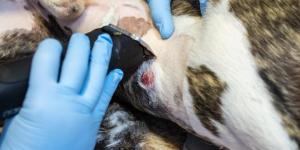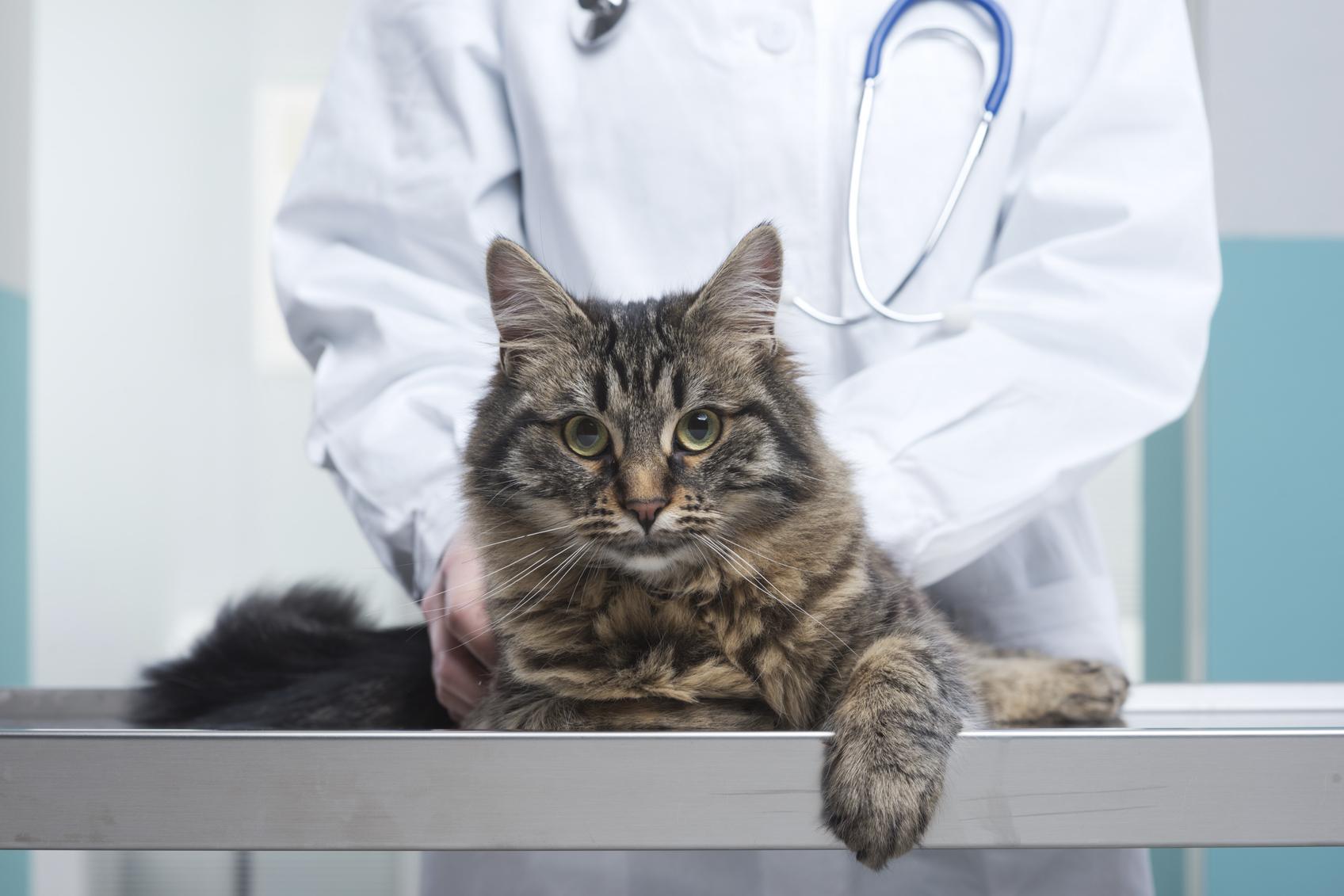My Cat Has a Swollen Anus

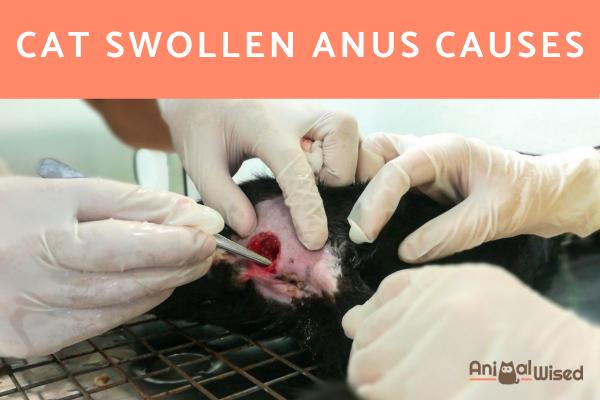

See files for Cats
An inflamed anus in cats can be due to gastrointestinal issues, dermatitis, anal gland problems or even tumors. Cats are very hygienic animals, but if you see them licking their anus excessively, it could be due to inflammation. While the licking itself can cause the anus to be swollen and red, it is important to know there will be an underlying cause. These causes can be minor, but it is also possible they are life threatening. If treatment is not established, it is also possible we can see issues such as a prolapsed rectum which can be very painful.
At AnimalWised we look at what happens when my cat has a swollen anus. We discuss the possible causes, as well as find out what we treatment might help relieve the cat of their problem.
- Reasons your cat has a swollen anus
- Gastrointestinal disease
- Anal tumors
- Inflammatory infection
- Impacted anal glands
- Allergic reaction
- Foreign object
- Parasites
- Colitis
- Home remedies for a cat's swollen anus
Reasons your cat has a swollen anus
Since cat's anal and rectal tissue does not have hair follicles, we should be able to see it easily once the cat lifts their tail. A healthy cat anus should be light pink in color and healthy looking. If it is too pale, it may be a sign of a problem. This is less easy to detect than a swollen anus. When a cat's anus is swollen, it will likely be a different color, usually some variation of red or purple.
Inflammation of the anus and rectal lining is known as proctitis. Idiopathic proctitis happens when there is no observable cause, but a swollen and red anus is likely caused by one of the following:
- Gastrointestinal disease
- Tumors
- Inflammatory infection
- Impacted anal glands
- Allergic reaction
- Foreign object
- Parasites
- Colitis
It is important to note the difference between a swollen anus and rectal prolapse. A rectal prolapse in cats occurs when the rectal tissue exits out through the anus. Although the anus will likely be swollen during this process, it is a secondary symptom of the prolapse. Since a prolapse is usually caused by a disorder which requires the cat to strain to defecate, it is possible the cat's anus will be swollen before this happens.
Anal inflammation in cats should be addressed, but in most cases it is not a serious problem and can usually be treated fairly easily. A rectal prolapse is considered a veterinary emergency and requires immediate intervention.
Below we detail the main reasons why a cat has a swollen and red anus.
Gastrointestinal disease
The most common cause of anal inflammation in cats is some type of gastrointestinal disease. This is an umbrella term for various different disorders which range in symptomology and severity. As it affects the digestive tract, it is often related to what the cat eats, but not exclusively.
One common problem which causes gastrointestinal upset is poor diet. This might be that the cat is given food with poor nutrition or that the diet they eat is inappropriate for their health status. Inappropriate diet often results in diarrhea, as do many other types of gastrointestinal disease. This is one of the reasons you may see liquid coming from your cat's anus.
Whether the stool is too soft or two hard, it can cause the cat to irritate their anus which causes you to see a red cat butt that is inflamed. Loose stool can also collect around the anus, encouraging bacteria and causing further inflammation. Conversely, constipation in cats can also agitate the anus. If the stools are too large or hard, straining puts pressure on the anus and results in swelling.
Treatment of this problem will depend on the cause of the gastrointestinal disease. If it is diarrhea, the cat may need more fluids to combat dehydration, if it is constipation they may need for fiber. Age also affects treatment, as can be seen in our article on older cats with diarrhea.
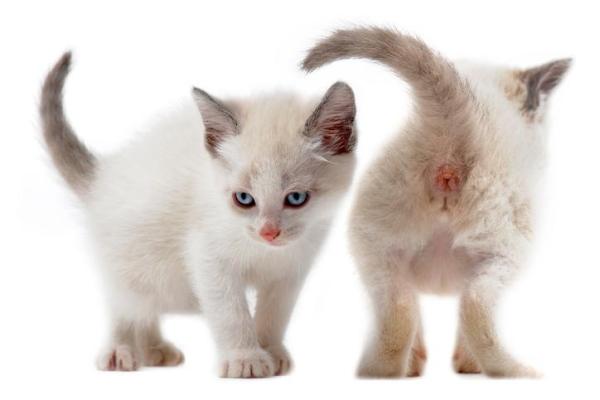
Anal tumors
Tumors are a type of neoplasm which can develop almost anywhere on the body, including the cat's anus. Some are malignant, others are benign growths. However, even benign growths can cause distress to the cat, especially if they are on the anus. They can negatively affect their ability to defecate and cause serious irritation.
Since the cat's anus is exposed to sunlight, it is possible they can get skin cancers known as melanoma. However, squamous cell carcinomas in cats are more likely to affect their anus. Fortunately, any type of anal cancer is uncommon in cats. If there are tumors on the anus or rectum, they are more likely to be benign neoplasms.
Treatment of any kind of tumor will depend on its cause. Usually, it will require some kind of surgical removal. If the tumor is cancerous, a combination of surgery, chemotherapy and/or radiotherapy may be required. Prognosis will depend on whether the cancer has metastasized to other parts of the cat's body.
Inflammatory infection
If a cat has a viral, bacterial or fungal infection, a swollen anus may be one of the symptoms. The types of these infections are incredibly varied, but they can be systemic or local.
For local infections, it is possible the cat will have a bacterial infection. If the cat's anus is damaged due to strain or due to some other physical trauma affecting the area, it is likely bacteria will enter the wound. This is often via the fecal matter of the cat. Bacteria which cause the infection can lead to inflammation. If the infection is severe enough, the cat will need antibiotic treatment.
In general, the treatment will depend on the cause. For viral infections, anti-viral medication may be used in rare cases. Most commonly, the treatment will require symptom management until the body can repair itself.
Impacted anal glands
The anal glands of a cat are located beside the anus. The purpose of these glands is to both lubricate the anus for defecation and to release scent to mark territory. The pheromones released by the anal glands (also known as anal sacs) help other cats to identify and learn information about them. Although this problem doesn't directly affect the anus, the location of the anal glands can result in the anus becoming swollen and red.
When there is a blockage in the duct of the gland, it can lead to something known as anal sac disease. This means the glands become impacted with their secretions, often due to dirt accumulation. Especially in older cats, it is common for these anal glands to be expressed manually by the guardian or veterinarian. If they don't, the impaction and build and develop a secondary infection. In extreme cases, this can lead to a painful abscess.
Allergic reaction
As we have stressed before, the anus is made from a certain type of skin tissue. As with other skin tissues, it can suffer an allergic reaction if it comes in contact with the corresponding allergen. Since the anus is on the cat's rear, it is most likely the problem will occur when the cat sits down on something which contains the allergen.
An example may be if the cat has a sensitivity to a certain ingredient in a cleaning product. If the floor has just been cleaned with this product, the cat may experience contact dermatitis. The anus can become inflamed and red. In these cases, a veterinarian will likely rule out other possible causes first. Then a process of elimination may be carried out until the correct allergen is found.
Foreign object
If a cat eats something it shouldn't, then it is most likely to get stuck in their throat before it reaches their lower digestive tract. Guardians are usually notified when the cat makes choking noises.
However, if the foreign object is small enough, it may pass through the bowel. Non-organic objects will likely not be digested. If they have are large enough or even have a pointed side, they might cause an anal fissure. This is a little tear in the tissue of the anus which can be quite painful. If bacterial enters the fissure, it can also lead to a secondary infection.
In acute cases, the infected fissure can lead to a perianal fistula. This is where pus builds up enough to cause inflammation and the anus becomes swollen and red. This may need to be drained and antibiotics provided to help fight the infection.
Parasites
Another problem which can lead to a cat's anus becoming swollen and red is a parasitical infestation. In these cases, the internal parasites of cats can leave eggs and even worms which come out through the anus since they aren't digested by the colon. The act of passing through the anus can irritate it and lead to redness and swelling. Treatment usually consists of antiparasitic drugs.
Colitis
Colitis is a general term for inflammation of the colon. The cat's colon is very long and made up of many sections. The final section is the rectum and anus. If the inflammation occurs further up the colon, it can still affect the anus as its symptoms include diarrhea and other problems which can result in anal swelling.
Colitis in cats can be acute (lasts for a short time) or chronic (either lasts for a prolonged period or is recurring). There are various causes, many of them related to the above causes of anal swelling. There are also idiopathic causes and many are linked to inflammatory bowel disease. It is also linked to autoimmune disease. With colitis, we are likely to see blood in the cat's feces.
Colitis can be life threatening, but its treatment will depend on the cause. If it is chronic, it can seriously affect the cat's well-being, so you will need take them to a veterinarian for diagnosis and treatment options.
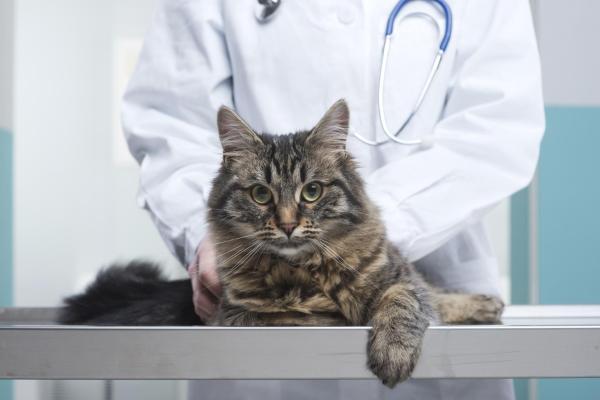
Home remedies for a cat's swollen anus
As we have seen, a cat's inflamed anus has various causes. It is vital to consult with a veterinarian for a proper diagnosis and treatment. Home remedies should only be considered as a temporary measure and should not replace professional veterinary care. With this in mind, there are some general steps you can take at home while waiting for a veterinarian's guidance:
- Keep the area clean: gently clean the affected area with a warm, damp cloth or a hypoallergenic, fragrance-free baby wipe. Ensure that the area is free from fecal matter or debris that might exacerbate the irritation.
- Monitor diet: ensure your cat's diet is well-balanced and consists of high-quality cat food. Some cats may have sensitivities or allergies to certain ingredients, which can lead to gastrointestinal issues and anal irritation.
- Prevent constipation: adequate water intake is essential to prevent constipation, which can contribute to anal discomfort. Ensure your cat has access to fresh water at all times and use other ways to encourage your cat to drink, if necessary.
- Litter box hygiene: keep your cat's litter box clean and scoop waste regularly. An unclean litter box can lead to irritation and discomfort for your cat.
- Consult a veterinarian: it's crucial to consult a veterinarian to determine the underlying cause of the swelling and redness. The vet can prescribe appropriate treatment, such as anti-inflammatory medications, antibiotics or dietary changes, based on the diagnosis.
- Avoid over-the-counter medications: refrain from using over-the-counter creams or ointments without veterinary approval, as they may not be safe or effective for your cat. They can even increase the swelling and redness in some cases.
Remember that anal swelling and redness can be a symptom of various conditions. A veterinarian's evaluation is essential to pinpoint the cause and provide appropriate treatment to ensure your cat's well-being.

This article is purely informative. AnimalWised does not have the authority to prescribe any veterinary treatment or create a diagnosis. We invite you to take your pet to the veterinarian if they are suffering from any condition or pain.
If you want to read similar articles to My Cat Has a Swollen Anus, we recommend you visit our Other health problems category.




